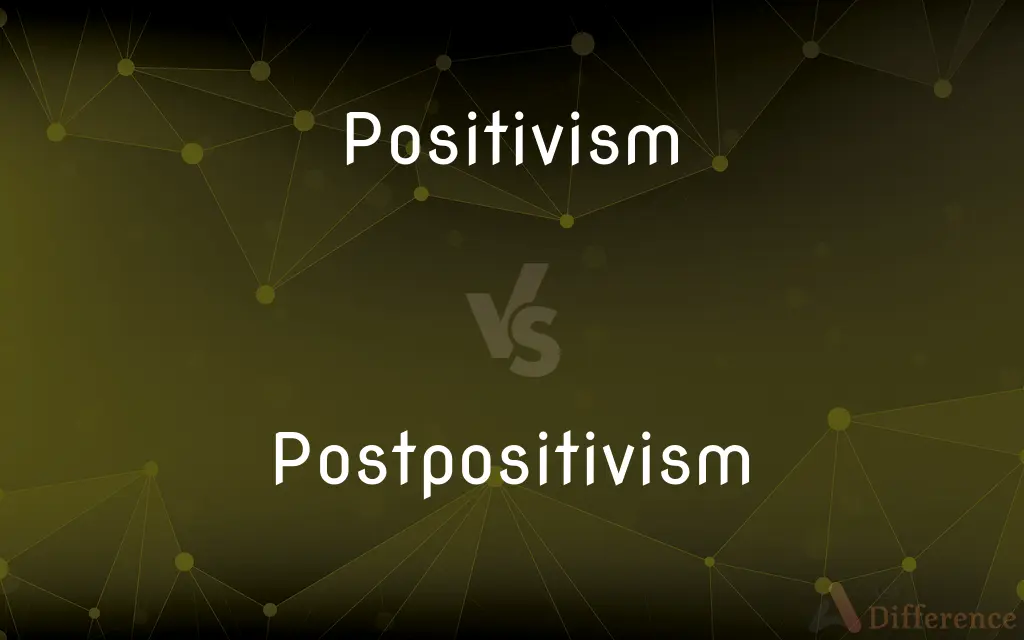Positivism vs. Postpositivism — What's the Difference?
Edited by Tayyaba Rehman — By Fiza Rafique — Updated on September 27, 2023
"Positivism" asserts that only empirical observations are valid knowledge, while "Postpositivism" recognizes the potential flaws in empirical observations and embraces a more critical interpretation of data.

Difference Between Positivism and Postpositivism
Table of Contents
ADVERTISEMENT
Key Differences
"Positivism" is a philosophical approach that upholds that valid knowledge arises only from observable and measurable facts. On the other hand, "Postpositivism" emerged as a critique of positivism, suggesting that reality is not always observable or easily measurable.
In "Positivism," there is a strong belief in objectivity, and knowledge is often seen as value-free. "Postpositivism," conversely, recognizes that researchers might be influenced by their own beliefs and values, which can impact their observations.
"Positivism" tends to adhere strictly to the scientific method, believing that it produces unquestionable results. "Postpositivism," however, believes that all observations are fallible, and results might not always represent an absolute truth.
While "Positivism" predominantly champions deductive reasoning, starting with a theory and then testing it, "Postpositivism" is more flexible, allowing for both deductive and inductive reasoning in research processes.
"Positivism" usually aims for generalizable results that can be universally applied. "Postpositivism" tends to understand that context matters, and results might not be universally applicable due to varying conditions and interpretations.
ADVERTISEMENT
Comparison Chart
Philosophical Stance
Knowledge from empirical observations
Critical approach to empirical data
View on Objectivity
High belief in objectivity
Recognizes potential biases
Approach to Science
Strict adherence to the scientific method
Accepts fallibility of observations
Reasoning
Predominantly deductive
Allows both deductive and inductive
Generalizability of Results
Seeks universally applicable results
Understands context-specific results
Compare with Definitions
Positivism
Emphasis on empirical observations.
Her study, rooted in positivism, relied strictly on quantitative data.
Postpositivism
Acknowledgment of observational flaws.
Adopting postpositivism, she was cautious of potential biases in her study.
Positivism
Philosophy of science approach.
Positivism was the cornerstone of many early scientific explorations.
Postpositivism
Embraces both deductive and inductive reasoning.
Postpositivism in his methodology allowed flexibility in theory testing and development.
Positivism
Knowledge from observable facts.
Positivism drove his belief in evidence-based conclusions.
Postpositivism
Context-sensitive knowledge acquisition.
With postpositivism, he knew results might vary in different settings.
Positivism
Pursuit of objective knowledge.
In his research, he leaned towards positivism, avoiding personal biases.
Postpositivism
Critical view of empirical data.
His postpositivism stance led to a nuanced interpretation of the experiment's results.
Positivism
Positivism is a philosophical theory that holds that all genuine knowledge is either positive—a posteriori and exclusively derived from experience of natural phenomena and their properties and relations—or true by definition, that is, analytic and tautological. Thus, information derived from sensory experience, as interpreted through reason and logic, forms the exclusive source of all certain knowledge.Verified data (positive facts) received from the senses are known as empirical evidence; thus positivism is based on empiricism.Sociological positivism holds that society, like the physical world, operates according to general laws.
Postpositivism
Recognition of non-universal truths.
Postpositivism informed her understanding that findings might not apply everywhere.
Positivism
A doctrine contending that sense perceptions are the only admissible basis of human knowledge and precise thought.
Postpositivism
Postpositivism or postempiricism is a metatheoretical stance that critiques and amends positivism and has impacted theories and practices across philosophy, social sciences, and various models of scientific inquiry. While positivists emphasize independence between the researcher and the researched person (or object), postpositivists argue that theories, hypotheses, background knowledge and values of the researcher can influence what is observed.
Positivism
The application of this doctrine in logic, epistemology, and ethics.
Postpositivism
(philosophy) A metatheoretical stance that critiques and amends positivism. While positivists believe that the researcher and the researched person are independent of each other, postpositivists accept that theories, background, knowledge and values of the researcher can influence what is observed. They believe that human knowledge is based not on unchallengeable, rock-solid foundations, but rather upon human conjectures.
Positivism
The system of Auguste Comte designed to supersede theology and metaphysics and depending on a hierarchy of the sciences, beginning with mathematics and culminating in sociology.
Positivism
Any of several doctrines or viewpoints, often similar to Comte's, that stress attention to actual practice over consideration of what is ideal
"Positivism became the 'scientific' base for authoritarian politics, especially in Mexico and Brazil" (Raymond Carr).
Positivism
The state or quality of being positive.
Positivism
(philosophy) A doctrine that states that the only authentic knowledge is scientific knowledge, and that such knowledge can only come from positive affirmation of theories through strict scientific method, refusing every form of metaphysics.
Positivism
(legal) A school of thought in jurisprudence in which the law is seen as separated from moral values; i.e. the law is posited by lawmakers (humans).
Positivism
A system of philosophy originated by M. Auguste Comte, which deals only with positives. It excludes from philosophy everything but the natural phenomena or properties of knowable things, together with their invariable relations of coexistence and succession, as occurring in time and space. Such relations are denominated laws, which are to be discovered by observation, experiment, and comparison. This philosophy holds all inquiry into causes, both efficient and final, to be useless and unprofitable.
Positivism
The form of empiricism that bases all knowledge on perceptual experience (not on intuition or revelation)
Positivism
A quality or state characterized by certainty or acceptance or affirmation
Positivism
Belief in measurable truths.
Positivism shaped her trust in concrete evidence over subjective opinions.
Common Curiosities
Does positivism reject qualitative research?
Not outright, but positivism highly values quantifiable, empirical data, which often aligns more with quantitative research.
Is postpositivism a total rejection of positivism?
No, postpositivism builds upon positivism, critiquing and expanding its perspectives.
Is positivism still popular in research today?
While some fields value positivism, many modern researchers lean towards postpositivism for its flexibility.
Which is more objective: positivism or postpositivism?
While both aim for objectivity, positivism asserts stronger objectivity, while postpositivism acknowledges potential biases.
Are there fields where one approach dominates?
Some hard sciences lean towards positivism, while social sciences might lean more towards postpositivism.
Can both positivism and postpositivism be used in one study?
Yes, a researcher can blend elements from both, although they present contrasting philosophical views.
Is one approach better than the other?
Neither is universally better; the choice depends on the research question, method, and philosophical alignment of the researcher.
Why did postpositivism emerge?
Postpositivism emerged as a response to the perceived limitations and rigidities of positivism.
Do all researchers explicitly identify their stance?
Not always, but clarifying one's stance can lend transparency and coherence to research.
How do the two views treat anomalies in data?
Positivism might see them as errors, while postpositivism might consider them as intrinsic complexities of reality.
Can postpositivism be seen in fields outside of research?
Yes, postpositivist thinking, with its critical and nuanced approach, can influence various disciplines.
What's the main goal of positivism in research?
Positivism seeks to uncover objective and universal truths through empirical observation.
How does postpositivism view the nature of reality?
Postpositivism believes reality is complex, often multi-layered, and not always directly observable.
Is postpositivism newer than positivism?
Yes, postpositivism emerged as a subsequent critique and expansion of positivist views.
Does positivism always yield clear-cut answers?
Not necessarily, but it seeks definitive, empirically-backed conclusions.
Share Your Discovery

Previous Comparison
Automobile vs. Van
Next Comparison
Intentional vs. WillfulAuthor Spotlight
Written by
Fiza RafiqueFiza Rafique is a skilled content writer at AskDifference.com, where she meticulously refines and enhances written pieces. Drawing from her vast editorial expertise, Fiza ensures clarity, accuracy, and precision in every article. Passionate about language, she continually seeks to elevate the quality of content for readers worldwide.
Edited by
Tayyaba RehmanTayyaba Rehman is a distinguished writer, currently serving as a primary contributor to askdifference.com. As a researcher in semantics and etymology, Tayyaba's passion for the complexity of languages and their distinctions has found a perfect home on the platform. Tayyaba delves into the intricacies of language, distinguishing between commonly confused words and phrases, thereby providing clarity for readers worldwide.
















































